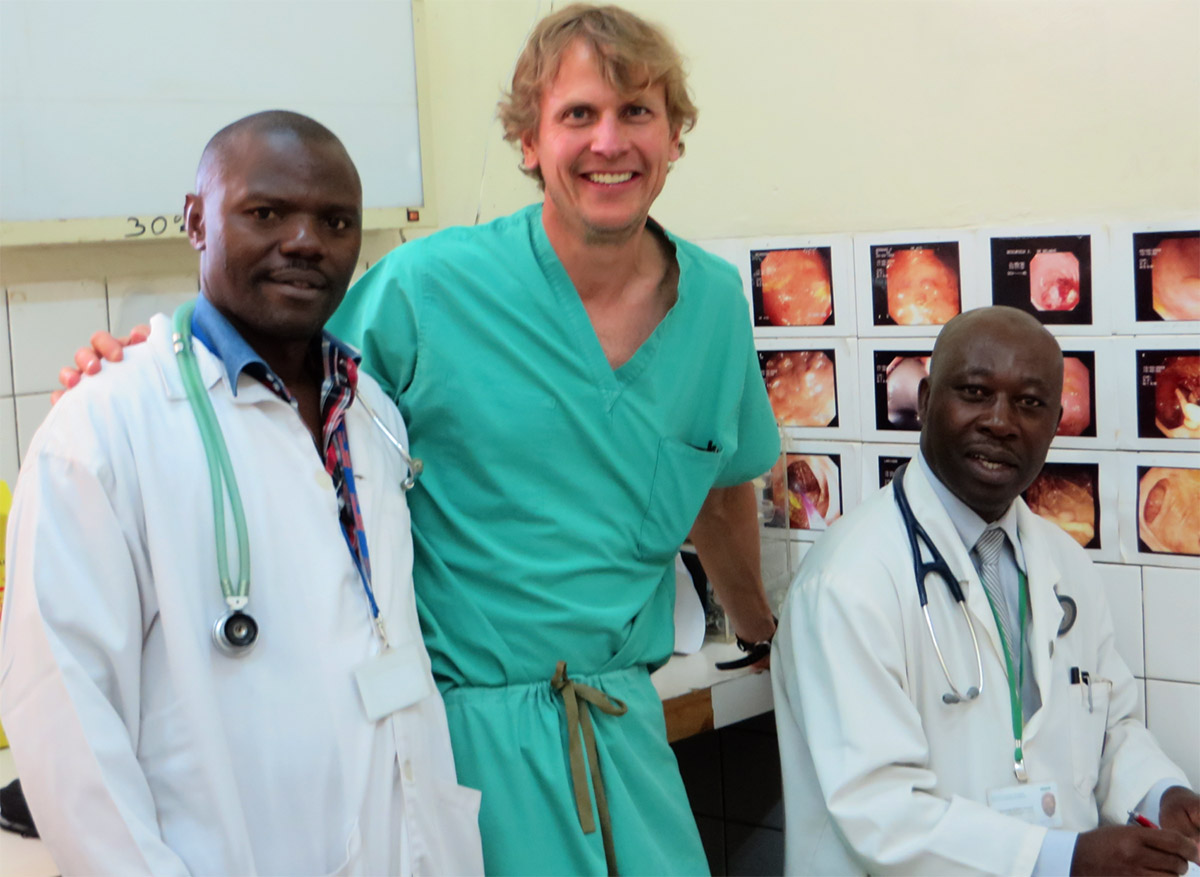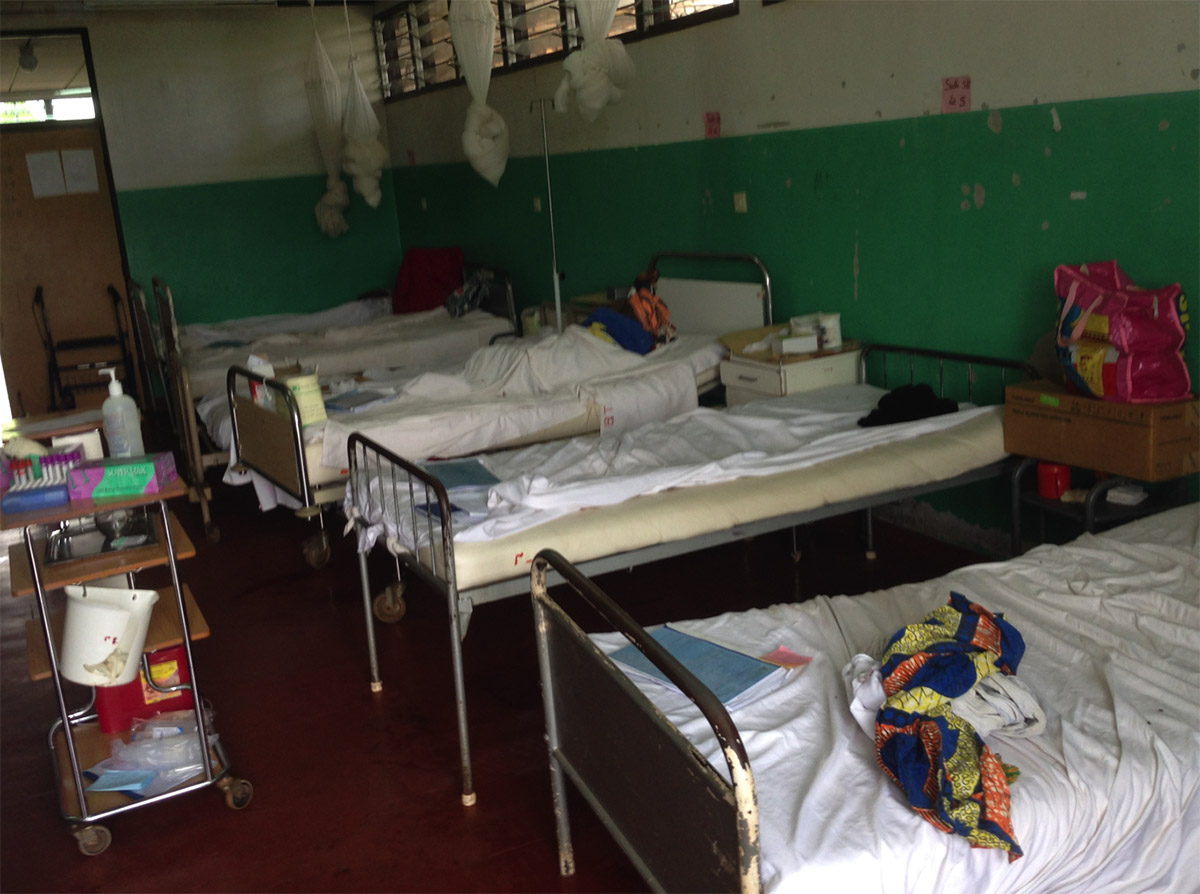When Steve Bensen (’90) talks about the two months he spent in Rwanda earlier this year, you can hear the optimism in his voice. Exhilarated by his first foray into global health, he wants to help others have a similar experience.
Bensen, an associate professor of medicine at Dartmouth's Geisel School of Medicine and physician at Dartmouth-Hitchcock Medical Center, who specializes in gastroenterology and hematology, is the first gastroenterologist to participate in the Human Resources for Health (HRH) program. A seven-year partnership between the Rwandan Ministry of Health, the Clinton Foundation, and several U.S. medical schools, including Geisel, HRH is committed to rebuilding the medical education and health-care systems in Rwanda.
“I tried for a number of years to do something like this and investigated different avenues,” Bensen says. “But it’s difficult for a gastroenterologist because we are dependent on technology when offering our skills.”

Although there is significant gastrointestinal (GI) disease in Rwanda, physicians lack both the equipment and training to provide specialized care. Armed with hundreds of donated endoscopic devices—biopsy forceps, snares, balloon dilators, PEG kits, and esophageal band ligators—Bensen’s goals were to teach physicians, residents, and interns to perform simple GI procedures and to show hospital managers the importance of providing these devices. “There’s an amazing amount of good to be done with fairly simple instruments,” he says.
Benson divided his time between two hospitals, Centre Hospitalier Universitaire de Butare (CHUB), where he partnered with Tim Walker, an Australian gastroenterologist, and Centre Hospitalier Universitaire de Kigali (CHUK), where he partnered with Rwandan physician Vincent Dusabejambo, an internist.
Rounds were like going back in time in terms of the advanced state of pathological findings. “Diseases that you read about in textbooks and that you may see once-in-a-lifetime are common there,” he says.
One such case came when Bensen saw a 29-year-old male patient whose spine had been destroyed by vertebral tuberculosis, also know as Pott’s Disease, and was unable to walk. “The residents got into a heated discussion about the duration of treatment and then asked me what I did in my big American hospital,” Bensen recalls. “They were a bit disillusioned when I had to admit that we haven’t seen a case of Pott’s Disease in the past 30 years.”
By the time patients reach one of Rwanda’s four academic referral hospitals, they are in the late stage of severe disease. With the availability of universal health insurance their first line of defense when sick is to visit a community health center. Those who are very sick, Bensen explains, are sent to a district hospital staffed by recent medical school graduates. From there, the sickest patients are sent to one of the four teaching hospitals, two of which are CHUB and CHUK.
Rwandan hospitals bear little resemblance to modern American hospitals. Their large buildings with open wards are filled with rows of patient beds. There are one or two nurses for each ward of 48 patients. Patients are required to bring a caregiver with them, usually a family member or a friend. The caregiver is responsible for buying medicine, administering the medicine, doing laundry, and cooking meals.
“In some ways, the medical system here is far behind our system; in others we can learn a lot from them,” Bensen says. “Patients are never alone, there are always so many people around, whether outside on the lawn overlooking the beautiful mountains or sitting at their bedside, patients are with their loved ones.”
The wealth of warmth and caring found in the hospitals is a stark contrast to the dearth of resources. There were times, Bensen says, when the hospital labs didn’t have a reagent needed to run basic tests, or film to print CT scans. “Resourceful residents and interns would use their smartphones to snap photos of scans to show to me,” he says.

Bensen’s hands-on teaching sessions and lectures drew crowds of medical students and residents. To augment those sessions, he introduced interns and residents to “GI Bleeding Jeopardy”—none of them had heard of Jeopardy, nor were they familiar with television game shows, but they liked the new format and interactive learning style, Bensen says. Everyone was pushed beyond their comfort zone.
“Contributing to the education of Rwandan medical students, medical house staff, and physicians has been an incredible experience,”Bensen says. “There is a dedication to patient care and an enthusiasm for learning that is uplifting in spite of limited medical resources.”
The residents were so excited about the prospect of further specialty training within Rwanda that Dusabejambo asked Bensen to develop a proposal for a gastroenterology fellowship for submission to the Minister of Health. “We put forth a good proposal and I’m confident that it will be approved,” Bensen says.
It is hard for Benson to believe how much was accomplished in just two months, but he trusts in the ability of those he has trained. “There has been significant headway in advancing therapeutic endoscopy to a core group of experienced and dedicated doctors,” he says. “We have successfully performed multiple dilations with life-changing results, and we performed more than 20 esophageal band ligation procedures. And we placed two PEG feeding tubes in patients. Yet so much more remains to be done.”
Committed to giving Dartmouth trainees an opportunity to have a similar experience to his, Bensen intends “to be as influential as I can to make exchanges possible—sending our trainees to Rwanda and bringing Rwandan trainees here.” He’s been invited by Walker to return for three months next spring, and Bensen will be taking three trainees and a GI fellow with him.
“I wish I’d been able to do something like this sooner,” he says. “This experience has been inspiring and it makes you reflect on why you went into medicine—you come away from it feeling like you’ve really done some good.”